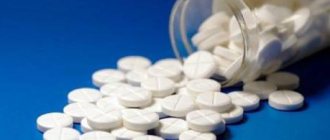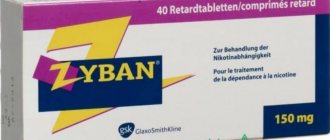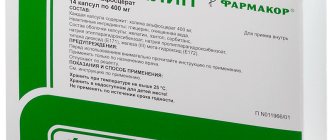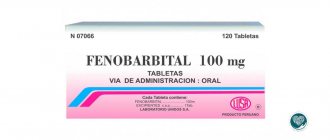Phenobarbital is one of the most common barbiturates, an anti-seizure drug that often causes persistent physical and psychological addiction in patients who take it.
Patients have a question: “Does Phenobarbital cause dependence?” To answer this question, you need to remember that this drug belongs to the class of barbiturates and any barbiturate is addictive. Barbiturates act as depressants for the nervous system.
Phenobarb is a Schedule IV drug classified by the Drug Enforcement Administration. The drug's use is limited due to increasing abuse, especially among adolescents who often try to purchase phenobarbital drugs for recreational use. This use of phenobarbital is considered abuse and may be punishable by law.
Content:
- Effect of Phenobarbital on the body
- Effect on humans of Phenobarbital used in high doses
- When narcotic medicine is strictly prohibited
- How addiction develops
- How to understand that a person is “sitting” on Phenobarbital
- What does phenobarbital addiction lead to?
- How to deal with addiction
Phenobarbital drug addicts use it for a reason.
It quickly causes physical dependence if used uncontrollably. The drug belongs to the pharmacotherapeutic group “Anticonvulsants” and is a representative of barbiturates. Prescribed to patients with various forms of epilepsy, with the exception of absence seizures.
Also, sometimes narcologists prescribe it to alcoholics suffering from painful withdrawal symptoms. Shows pronounced hypnotic and sedative properties.
Side effects
Possible undesirable effects on various organs and tissues. High dosages are especially dangerous, affecting the functioning of the brain stem and the general regulation of body functions. Also, some patients experience sensitivity of the immune system to the substances contained in the tablet form (allergy). Before prescribing the medication, the doctor explains what side effects may occur during therapy.
Incompatible with ethanol
Main adverse reactions:
- Nervous system: asthenic state, depression of the respiratory center, hypnotic effect in the daytime, lethargic state, cephalgia, mental and motor agitation, excessive motor activity, sleep disturbance, anxiety, hallucinations, incoordination of movements, nightmares, impaired thinking, dizziness, increased fatigue, decreased speed of psychomotor reactions, deterioration of concentration.
- Hematopoietic system: decreased concentration of leukocytes (due to monocytes and granulocytes) with an increased risk of infection, platelet deficiency, megaloblastic anemia (long-term use.)
- Heart and blood vessels: decreased blood pressure, low heart rate, collapse of blood vessels.
- Musculoskeletal system: impaired bone formation, rickets (long-term use.)
- Immunity: skin rashes, skin itching, tissue swelling, Stevens-Johnson syndrome, Lyell's syndrome, urticaria. Until death occurs.
- Digestive system: urge to vomit, stool retention, disruption of liver tissue.
- Others: addiction to the drug with the development of addiction, yellowing of the skin and sclera against the background of damage to the liver tissue, calcium deficiency, destruction of bone tissue, lack of folate, decreased sexual desire, erectile dysfunction, mental and physical dependence, withdrawal reaction.
In childhood and old age, excessive mental and motor agitation often occurs. Elderly patients experience other paradoxical manifestations, including asthenic conditions and sleep disturbances.
Effect of Phenobarbital on the body
The drug has an effect on the cerebral cortex and inhibits the functioning of the thalamus. Due to this, a pronounced hypnotic and sedative effect occurs. Its anticonvulsant activity is achieved by reducing neuronal excitability provoked by psychotropics or an existing mental disorder.
The sleep that occurs after using the drug Phenobarbital is very different from normal physiological sleep. Thus, the duration of the REM sleep phase is reduced, as are the third and fourth stages of slow sleep. The structure of human night rest is undergoing dramatic changes. The hypnotic effect appears within an hour after taking the medicine and lasts up to 8-12 hours. But after two weeks of regular use of Phenobarbital, its hypnotic effect becomes weaker.
If you combine the medication with antispasmodics, you will be able to quickly achieve positive dynamics in neurovegetative pathologies. The drug can reduce the activity of metabolic reactions and inhibit the main centers of thermoregulation. Because of this, the drug addict’s body temperature drops significantly.
How much phenobarbital does Corvalol contain?
The medicine is produced in the form of drops and tablets. In the first case, the drug contains 20 g of ethyl ether and 18.26 mg of phenobarbital. Excipients include 95% ethanol, peppermint oil, sodium hydroxide and purified water. The product is manufactured in the form of dropper bottles with a volume of 15 to 25 ml.
When a medicine is manufactured in the form of tablets, the quantitative content of the substances included in its composition changes. First of all, the phenobarbital content in Corvalol is significantly different - in this case it is 7.5 mg. The content of ethyl ester is 8.2 mg, peppermint oil is 0.58 mg. Excipients include: 55.55 mg beta-cyclodextrin, 43.77 mg lactose, 13 mg potato starch, 10.5 mg microcrystalline cellulose and 0.9 mg magnesium stearate. The tablets are round, white, with light inclusions and a flat surface.
Effect on humans of Phenobarbital used in high doses
An overdose of the drug causes serious harm to health. There are disruptions in the transmission of nerve impulses, and consciousness changes. The most dangerous complication is destruction and damage to the main nerve canals. With this pathology, symptoms such as:
- psychomotor excitability;
- inability to remain calm or sit still for even a short time;
- sense of anxiety.
If a person takes the drug in high doses for a long time, his nerve channels completely atrophy. But nerve impulses continue to look for a way out, so they pass along alternative courses of movement. As a result, the addict:
- involuntary contractions of the facial muscles occur (facial expressions look very strange);
- the tongue falls out;
- there is copious secretion of saliva;
- tremor of the fingers is observed.
The effect of Phenobarbital on the human body is very specific. In many drug addicts, the respiratory center is depressed. They begin to inhale less air. There is a feeling of lack of oxygen. Choking may develop.
Drug poisoning can be acute or chronic. A specific toxic dose for humans has not been established. It depends on age, gender, body weight, and health status. If you drink one gram of medication at a time, symptoms of acute intoxication will most likely appear.
The lethal dose of Phenobarbital is from two to ten grams. An addict develops symptoms reminiscent of alcohol poisoning:
- vomit;
- nausea;
- dizziness;
- stomach ache;
- severe headaches;
- problems with orientation in space;
- surges in blood pressure.
Signs of a neurological disorder also make themselves felt. Therefore, if a dose of Phenobarbital exceeding one gram is taken, you should receive qualified medical care as soon as possible.
Analogues of the drug
There are other medications based on this chemical compound. When choosing an analogue, you need to pay attention to the content of the active ingredient in the tablet and the instructions. Corvalol and other drugs with several active ingredients are not direct analogues of the drug. The selection of analogues should be carried out under the supervision of a specialist.
Existing analogues:
- Luminal.
- Phenobarbital tablets for children.
Children's analogue with a minimum dose
Any medications based on this substance are prescription drugs.
When narcotic medicine is strictly prohibited
The official instructions indicate the following contraindications to treatment with Phenobarbital:
- individual intolerance to barbiturates;
- severe anemia;
- chronic alcoholism;
- liver/renal failure;
- severe pathologies of the respiratory system;
- diabetes;
- pregnancy, lactation;
- tendency to develop drug/alcohol addiction (for example, if there is a history of these diseases);
- depression;
- suicidal tendencies;
- acute pain of any localization of unknown origin.
Under no circumstances should you combine the medicine with other depressants or alcohol. Such combinations increase the effects of Phenobarbital and lead to deadly complications.
Phenobarbital overdose
High doses depress the centers of the medulla oblongata, which leads, for example, to problems with the respiratory system, vascular collapse, and changes in the central nervous system. The result could be:
- vomit;
- pain in the eyes;
- increased sweating and salivation;
- respiratory arrest;
- pulmonary edema;
- heart failure.
Overdose is especially dangerous when combining phenobarbital with ethanol. Death can occur within one to two hours. Breathing stops in 95% of cases of overdose. In addition, brain activity may cease, but a person can be saved if the lack of oxygen does not lead to irreversible damage to brain structures. Therefore, at the first signs of poisoning, you should immediately call urgent drug treatment help.
- Standard
4,500 days.
dropper volume 500 ml
visit of a narcologist
- consultation with a narcologist
- detoxification
- doctor's orders
- medications for 3 days
- monitoring the patient's condition
patient examination*
order service
months
dropper volume 500 ml
- visit of a narcologist
patient examination*
order service
- Popular
Double
5,800 days.
dropper volume 1000 ml
visit of a narcologist
patient examination*
order service
Double
months
dropper volume 1000 ml
- visit of a narcologist
patient examination*
order service
- Intensive
7,500 days.
dropper volume 1500 ml
visit of a narcologist
patient examination*
order service
months
dropper volume 1500 ml
- visit of a narcologist
patient examination*
order service
How addiction develops
The medication gives a lasting effect of relaxation and tranquility. Therefore, many people, after completing a course of treatment, decide to continue using it. Since the active substance of the drug is eliminated from the body rather slowly, daily therapy often contributes to an overdose. The composition accumulates faster than the kidneys have time to neutralize and remove it.
Over time, the usual dose ceases to provide the desired feeling of euphoria. Then the novice drug addict increases it. This behavior can lead to death from overdose.
Phenobarbital dependence
Phenobarbital can lead to severe dependence after 14 days of use, and if we are talking about increased dosages, then a week will be enough for addiction to develop. If a person has previously taken a drug as prescribed by a doctor, he can continue it even if the need for it has ceased. The substance gives a feeling of relaxation and calm, which explains the irresistible psychological craving for it.
In physical terms, sleeping pills quickly form dependence, as they tend to accumulate in tissues. The longer a person takes phenobarbital, the more of its metabolites accumulate in cells, and the stronger the addiction.
This condition threatens to overdose - active metabolites accumulate much faster than they are eliminated. Tolerance to the usual dose gradually develops, and after just a few weeks the addict increases it.
Symptoms
The main symptom of established addiction is the appearance of withdrawal symptoms after discontinuation of the drug. It develops within 8-10 hours and is manifested by the following symptoms:
- tremor;
- muscle contractions, cramps;
- dizziness;
- weakness;
- nausea;
- vision problems;
- feeling of panic and fear;
- sleep disorder
Abrupt withdrawal of phenobarbital under conditions of prolonged and increased use provokes hallucinations, fainting, and coma. Withdrawal in some cases can be fatal.
Diagnostics
At home, diagnostics for the presence of phenobarbital metabolites in urine is carried out using special strips - rapid tests. In a clinical setting, the doctor makes a diagnosis based on anamnesis, conversations with the addict and relatives, and laboratory data. Among the latter: chromatographic tests, spectrometry.
How to understand that a person is “sitting” on Phenobarbital
You can recognize an addict by the following symptoms:
- detached look;
- complete lack of initiative;
- inability to focus on anything;
- lack of interest in what is happening around;
- constant drowsiness;
- excessive timidity;
- inadequacy and aggression towards relatives and friends.
Of course, all these signs are vague and non-specific. Therefore, if relatives do not know what medicine the addict is taking, they most likely will not guess anything. If they are aware of recent treatment with Phenobarbital, then they should think about the fact that the addict is continuing therapy without the knowledge of the doctor.
What does phenobarbital addiction lead to?
Many drug addicts think that since Phenobarbital is a pharmaceutical drug, it cannot cause serious harm to health. This is a deep misconception. Persons with a significant drug history often encounter:
- cardiovascular diseases;
- swelling;
- dermatitis;
- respiratory failure;
- unbearable pain in the back;
- mental disorders;
- very slow wound healing;
- nightmares;
- inhibition of speech and mental reactions.
The patient begins to behave strangely and inappropriately. He is constantly afraid of something. Periodically he has panic attacks. The condition is complicated by visual and auditory hallucinations.
Indications for the use of phenobarbital
Prescribed in neurological and psychiatric practice. It can be used only as an anticonvulsant or in the form of a drug that has a sedative and moderate anti-anxiety effect. The specialist assesses the patient’s condition and determines exactly how to use the medicine.
Medicine can only be prescribed by a doctor according to strict indications. Self-medication is prohibited.
Main indications
- Epilepsy and convulsive reactions in other pathological conditions.
- Increased anxiety, anxiety, unjustified fear.
- Mental disorders of the neurotic spectrum.
- Impaired motor activity (paralysis).
- Mental and motor agitation.
- Erratic and jerky motor activity (chorea).
- Vascular spasm.
- Eclampsia.
- Insomnia.
How to deal with addiction
To overcome the disease, you must completely stop taking the drug and any other barbiturates. The most reasonable thing is to contact a narcologist and undergo the treatment he suggests in an inpatient drug clinic.
Considering that the drug often causes suffocation, it is better for the drug addict to be constantly under medical supervision. In addition, sudden withdrawal from the drug sometimes results in coma.
Doctors always reduce the dose of Phenobarbital gradually to avoid negative changes in the patient's physical and mental condition. After about two weeks, withdrawal symptoms begin to subside, and health improves.
To fully recover, you need to devote time to rehabilitation. It lasts much longer than two weeks. You can go through it at a rehabilitation center.
Phenobarbital price, where to buy
You can buy Phenobarbital in Moscow and other Russian cities only with a doctor's prescription. It should also be taken into account that it is prohibited to import it into some countries. The price of Phenobarbital in tablets 100 mg, 6 pieces per package from 12 rubles. Although in general the cost can vary greatly depending on the manufacturer.
Despite the fact that the price of Phenobarbital can be relatively low, it is not so easy to find in pharmacies, so many people prefer to buy other complexes that contain its active ingredient.
Literature:
- Drug complications and ways to eliminate them: handbook. for doctors / I. B. Mikhailov, I. V. Markova. - M.; St. Petersburg : DILYA, 2004. - 329 p.
- Pharmacotherapy in neurology and psychiatry / ed. S. D. Enn and J. T. Coyle; lane from English edited by O. S. Levina; trans.: O. S. Andreev, K. M. Petrov, T. V. Naimushina. — Moscow: Med. information agency, 2006. - 799 p.
- Adverse drug reactions = Adverse drug reactions. General information / [Reichart D.V. et al.] ; edited by D. W. Reichart. - Moscow: Litterra, 2007. - 248 p.







